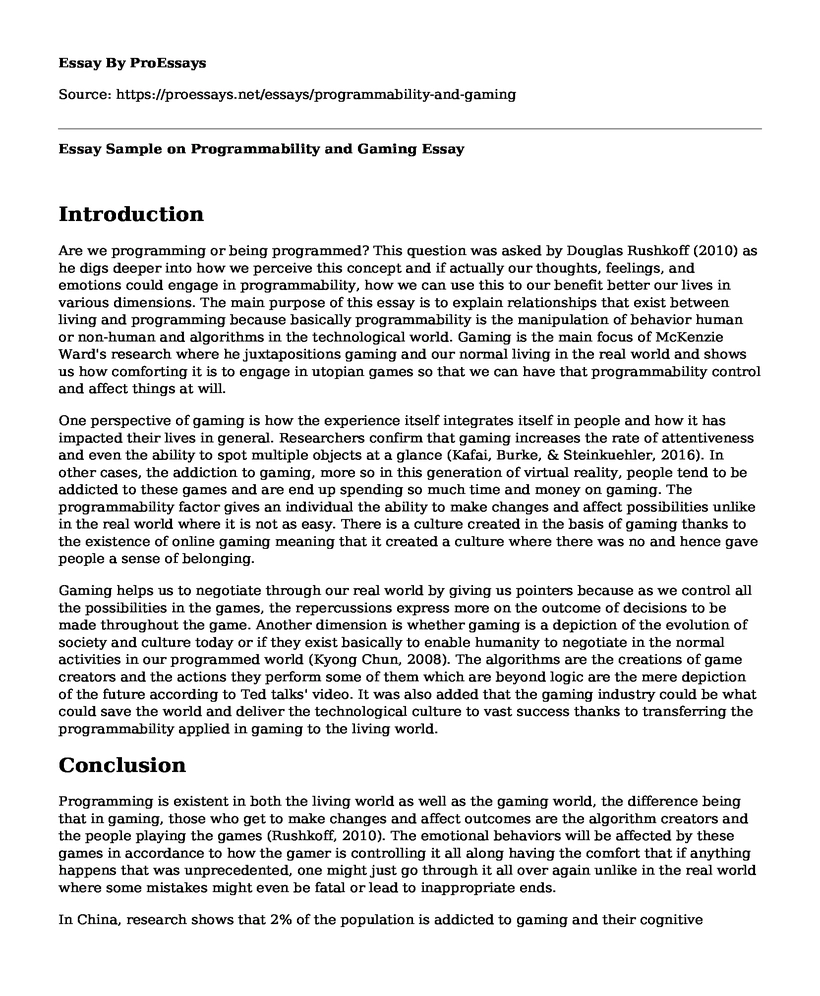Introduction
Are we programming or being programmed? This question was asked by Douglas Rushkoff (2010) as he digs deeper into how we perceive this concept and if actually our thoughts, feelings, and emotions could engage in programmability, how we can use this to our benefit better our lives in various dimensions. The main purpose of this essay is to explain relationships that exist between living and programming because basically programmability is the manipulation of behavior human or non-human and algorithms in the technological world. Gaming is the main focus of McKenzie Ward's research where he juxtapositions gaming and our normal living in the real world and shows us how comforting it is to engage in utopian games so that we can have that programmability control and affect things at will.
One perspective of gaming is how the experience itself integrates itself in people and how it has impacted their lives in general. Researchers confirm that gaming increases the rate of attentiveness and even the ability to spot multiple objects at a glance (Kafai, Burke, & Steinkuehler, 2016). In other cases, the addiction to gaming, more so in this generation of virtual reality, people tend to be addicted to these games and are end up spending so much time and money on gaming. The programmability factor gives an individual the ability to make changes and affect possibilities unlike in the real world where it is not as easy. There is a culture created in the basis of gaming thanks to the existence of online gaming meaning that it created a culture where there was no and hence gave people a sense of belonging.
Gaming helps us to negotiate through our real world by giving us pointers because as we control all the possibilities in the games, the repercussions express more on the outcome of decisions to be made throughout the game. Another dimension is whether gaming is a depiction of the evolution of society and culture today or if they exist basically to enable humanity to negotiate in the normal activities in our programmed world (Kyong Chun, 2008). The algorithms are the creations of game creators and the actions they perform some of them which are beyond logic are the mere depiction of the future according to Ted talks' video. It was also added that the gaming industry could be what could save the world and deliver the technological culture to vast success thanks to transferring the programmability applied in gaming to the living world.
Conclusion
Programming is existent in both the living world as well as the gaming world, the difference being that in gaming, those who get to make changes and affect outcomes are the algorithm creators and the people playing the games (Rushkoff, 2010). The emotional behaviors will be affected by these games in accordance to how the gamer is controlling it all along having the comfort that if anything happens that was unprecedented, one might just go through it all over again unlike in the real world where some mistakes might even be fatal or lead to inappropriate ends.
In China, research shows that 2% of the population is addicted to gaming and their cognitive functions have been altered in various ways according to the type of game which they play ("Gaming and Technology Addiction," 2017). Programmability can, therefore, be seen to affect people in different ways in accordance with the circumstances but generally, gaming has helped program the society without necessarily the stereotypical concept of humans submitting to technology (Kafai, Burke, & Steinkuehler, 2016). This, on the contrary, is technology somewhat submitting to humans in the parameters provided by the algorithms used to create the game.
References
Gaming and Technology Addiction. (2017). doi:10.4018/978-1-5225-0778-9
Kafai, Y. B., Burke, Q., & Steinkuehler, C. (2016). Connected Gaming: What Making Video Games Can Teach Us about Learning and Literacy. Cambridge, MA: MIT Press.
Kyong Chun, W. H. (2008). Programmability. Software Studies, 225-228. doi:10.7551/mitpress/9780262062749.003.0032
Rushkoff, D. (2010). Program or Be Programmed. doi:10.2307/j.ctt207g7rj
Cite this page
Essay Sample on Programmability and Gaming. (2022, Mar 07). Retrieved from https://proessays.net/essays/programmability-and-gaming
If you are the original author of this essay and no longer wish to have it published on the ProEssays website, please click below to request its removal:
- Paper Example on Internet Skills in Using Web Search Engines for Business Research
- Nursing Informatics: DIKW (Data, Information, Knowledge, and Wisdom) Essay
- Bloomberg Terminal Paper Example
- Safety Management Systems in Toshiba Organization - Essay Sample
- Essay Example on Accurate Documentation of Medical Histories in Patients
- Cyber Security Threat Landscape
- Network Security Intrusion: Mitigating Breaches With Holistic Approach - Essay Sample







